Disclaimer some of images may be disturbing to some readers
The British army was central to the colonisation and creation of the British Empire. This project’s aim is to highlight how the British army is portrayed and viewed by the British public and its former colonies. This project will first address why this subject matter is crucial in understanding not just the British perspective and how the British army is viewed but also the views of the oppressed peoples of the British Empire.
Secondly the project will explain the importance of the Suez crisis and why it is the main case study to exhibit how the British army is portrayed towards different peoples. The web page will explore the portrayal and views on the British army through the lens of four states; Britain, Egypt and Pakistan/India. Each state’s prior history with the British Empire and colonial experiences will also be explored to discover why they view the British army in certain ways. This will be beneficial in contrasting and analysing the relationship dynamic between the colonies and the British Empire.
This web page will also compare the different views to gain a thorough understanding of the views represented in the primary resources that this project will highlight. By the end of the project, by exploring and contrasting the myriad of views it would have determined whether or not British prestige had decreased for both the British public and the peoples of former colonies to the British Empire.
Why the Suez Crisis ?
The Suez Crisis was a crucial event that signified the British Empire’s collapse in the Middle East but also the regression of Britain’s power on the world stage becoming secondary actors to the new world powers of the USSR and the United States in the 60s. The Suez Crisis is a very prevalent event for this topic as in the 50s the British Army was active in the Suez Canal fighting with Egyptian forces prior to the crisis of 1956. Britain was also focused on how they were viewed, utilising propaganda in Egypt and also countering Egyptian propaganda.
The British army had bases garrisoned on the Suez Canal from 1945 to 1956. The position of the British Empire during this time period was unique as they had started their process of decolonisation in its former colonies such as India and South Africa. However the Middle East was different as they had tried to expand the British Empire’s influences. An example of this is the creation of the Central Treaty Organisation in 1955 (also known as the Baghdad Pact). Britain also had many economic ventures, one being its vested interest in the oil reserves of Western Asia such as Iran. The Suez Crisis was chosen due to Britain’s status and relationships with its former colonies but also the change of the British Army’s prestige before and after the event.
The loss to Egypt was considered to be humiliating and a turning point for Britain. This view is supported by John Darwin as he further expands that “Suez has been seen very widely as the real turning point in Britain’s post-war attempt to remain a great power. The crushing humiliation of the premature ceasefire; the enforced withdrawal of British and French troops; the public excoriation at the United Nations … these were misfortunes that befell lesser powers not one of the Big Three that had won the Second World War. Suez on this count appears as the end of illusion: a brutal exposure of geopolitical realities in a ‘superpower’ world.” (Darwin, 2009)The drastic change in Britain’s status on the world stage, the colonial factor being that the event was in the Middle East, Britain’s last bastion of imperialism. The fact that it was in Egypt is prevalent, the country was Britain’s former colony and the British army’s image was utilised for propaganda for both sides. Indeed, all these elements made this event crucial in answering this projects thesis, that this event had decreased British prestige domestically and in the former colonies.
Britain
The Suez Crisis also referred to as the Tripartite Aggression did not affect the prestige of the British army domestically. After the Nationalisation of the Suez Canal by Egyptian President Gamel Abdel Nasser in July 1956. Israel had sent troops on the 29th of October. Both France and Britain had sent troops soon after on the 5th of November. French, British And Israeli forces were successful in taking control of the Suez Canal however heavy political pressure from America’s president Dwight Eisenhower and also from the USSR resulted in the withdrawal of the forces from the Suez Canal zone leading to Egypt’s victory in this war.
The Suez Canal was vital for Britain and its empire. As Khalid Mahmood states “ the canal is the shortest route to the lands of her Commonwealth partners; and since the passage links British bases in Africa and the Middle East, it is a key consideration in her military strategy, as well as that of her Western Allies. The Suez Canal was very aptly termed as ‘the jugular vein of the British Empire”.(Mahmood, 1962) This is one of the main reasons as to why Britain had fought to regain control of the Suez Canal. The primary resources will explore how the British army was portrayed and highlight the fact that throughout the crisis its representation was consistent as the public and the media’s view of the army’s prestige did not change as the tripartite aggression did not have much impact on the Army’s image .
Before the invasion of the Suez Canal there was support for the war and the British army. This cartoon by Leslie Illingworth on the British satirical periodical Punch was published on the 17th of October 1956. This cartoon portrays the British Army as strong, unified and organised highlighting the army in a positive light to the British public. The rhyming lines beneath the cartoon mirror and copy the nursery rhyme of the Grand Old Duke of York which could be satire to ridicule Eden as this did originate from Punch.
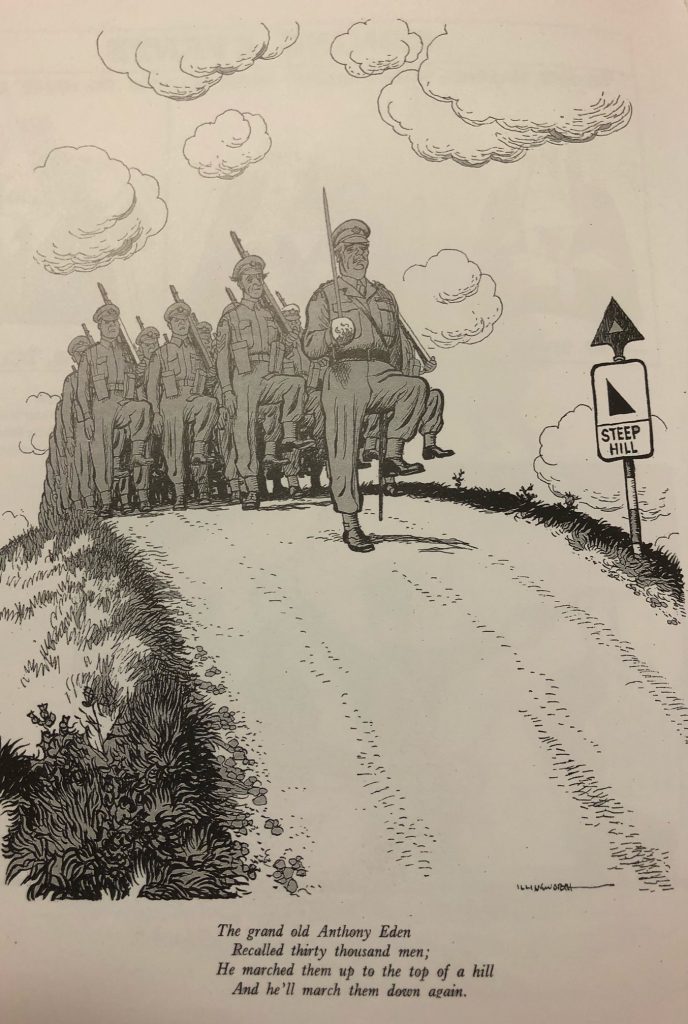
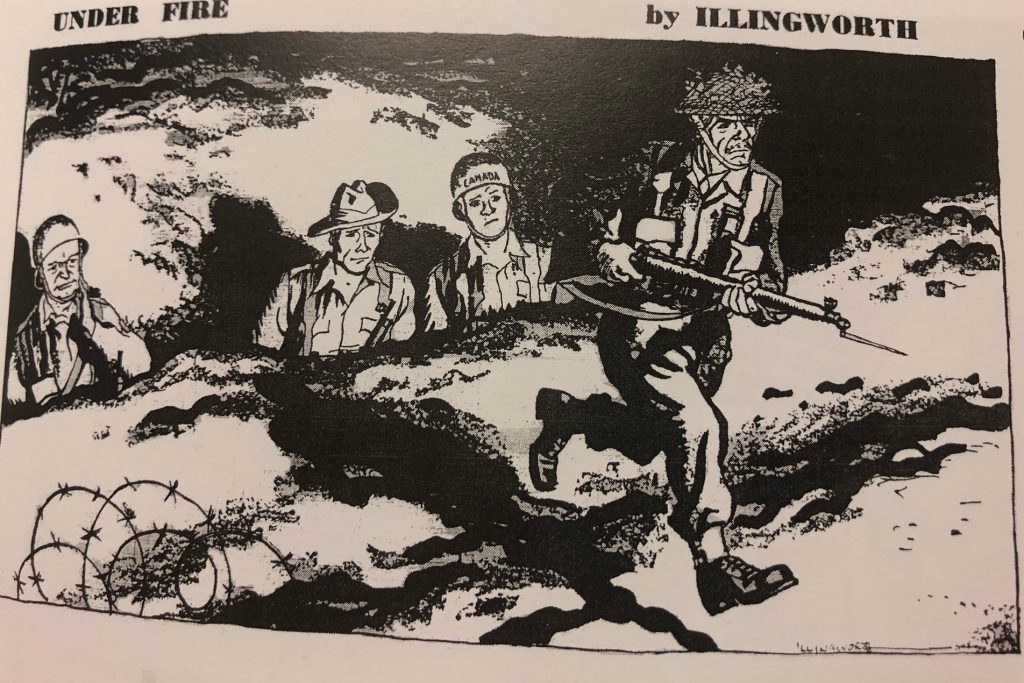
Another piece made by Leslie Illingworth was published in a different newspaper which was the Daily Mail which is aimed for the lower to middle class of Britain. This cartoon published on the 1st of November 1956 highlights Eden as a British soldier and portrays him and in turn the army as courageous ‘under fire’. It also paints America, Canada and Australia as cowards who do not run with Britain even though they are allies.
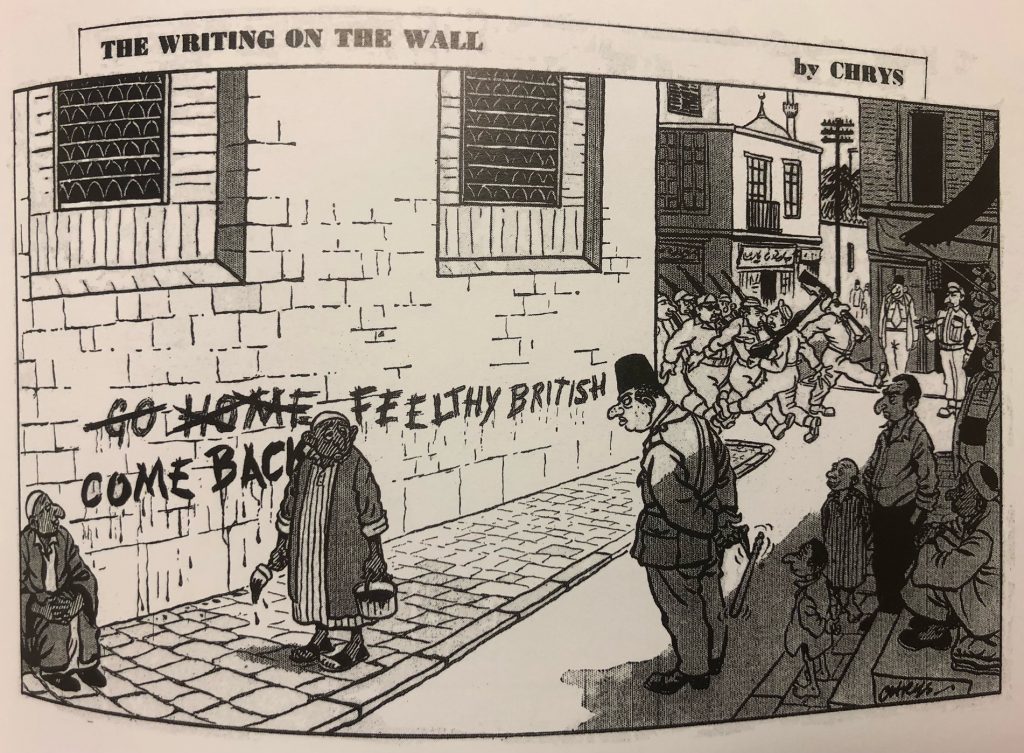
This cartoon made by George Chrystal who was the Daily mail cartoonist published this on the 31st of October 1956.The image does not include the British Army however it comedically implies the need for them by the Egyptian people who are portrayed to be unhappy by the current Nasser regime and Egyptian forces. They ask for the British Army to come back impling to save them from this regime and implicitly framing the British army as saviours of the Egyptian people. The first three cartoons from the British press are to be questioned as Tony Shaw states that “From July through to December 1956 the press was consistently more aggressive and pro war than was public opinion” (Shaw, 1996)
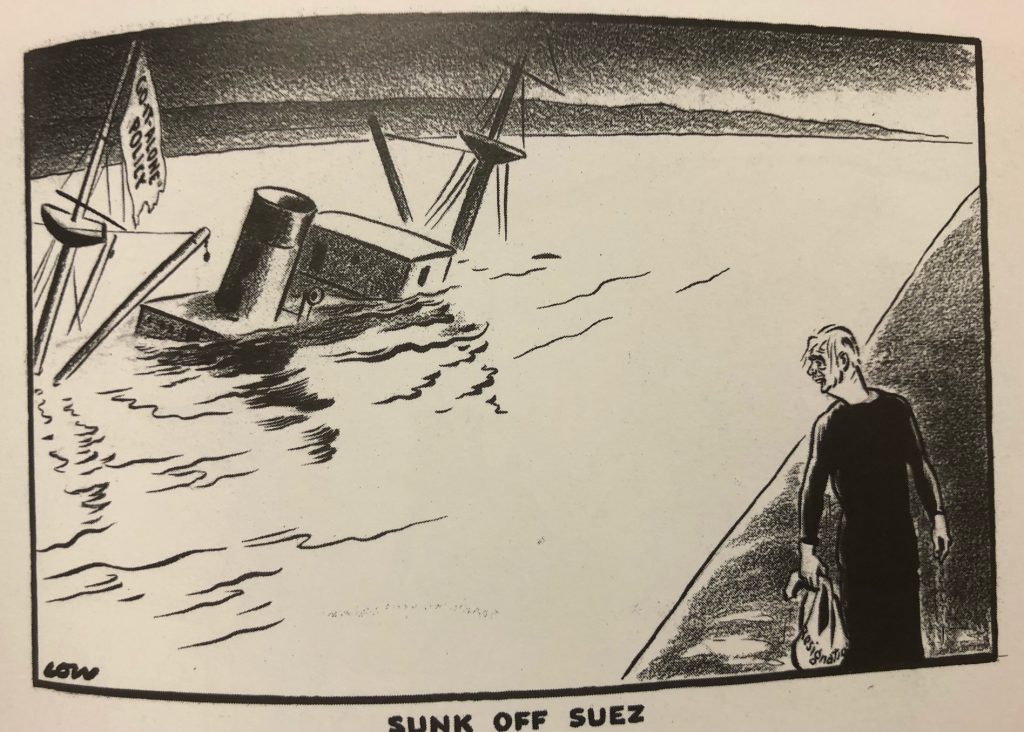
The imagery of the Suez crisis with media and cartoons shifts away from the army and focuses on Anthony Eden’s political failure instead. An example being this cartoon made by British cartoonist David Low who published this work in the Guardian on the 11th of January 1957. This was published 2 days after Eden’s resignation as Prime Minister and explicitly links Eden’s failure in the Suez Crisis as the downfall of his career.
The imagery of the British army used in the media had decreased after the crisis as the shift in media narrative had turned to the political failures of Eden’s administration. Even with regard to anti-war protests in Britain, at its peak resulting in 30,000 people protesting in Trafalgar square on the 4th of November. The outcry was not directed at the army but to the government. Indeed, proving a part of this project’s thesis wrong, the British army’s prestige within Britain remained the same; instead, Eden and his government were used as scapegoats and blamed for the Suez Crisis.
Egpyt
For Egypt the British Army’s prestige did decrease due to the Suez Crisis. Britain’s occupation of Egypt dates back to 1882 during the Anglo-Egyptian war. The country gained independence from Britain on February 28th in 1922. However British forces remained in the Suez Canal zone until the 1950s due to the Anglo-Egyptian treaty of 1936. The colonial experience of the Egyptian people resulted in a limited amount of prestige of the British army in Egypt. The colonisation and domination of Egypt by Britain created this experience. An example being the Egyptian revolution of 1919 in which James Kitchen describes as “one of Britain’s bloodier post-war imperial campaigns”. (Kitchen, 2015) The only aspect that is prestigious for the British army for former colonies such as Egypt is its power. Nasser and the Egyptian government utilise propaganda to affect how Britain is portrayed and rally more support from the Egyptian people and international support during the 1956 crisis.
This is evidenced in the primary resource from James Vaughan which are the British Embassy’s reports on Egypt’s propaganda campaign against the British army. One example that is brought up is the government radio broadcast by Voice of the Arabs on October 31st “France and Britain the Imperialists have bombed your Cairo … the battle will be fierce since the Imperialists have bombed Cairo” (Vaughan, 1956). The repetitive use of the word imperialists reminds the listeners of the Imperialist history and colonial crimes that the British army had done to their country as well as using ‘your Cairo’ to give a sense of duty to fight against Imperialist Britain.
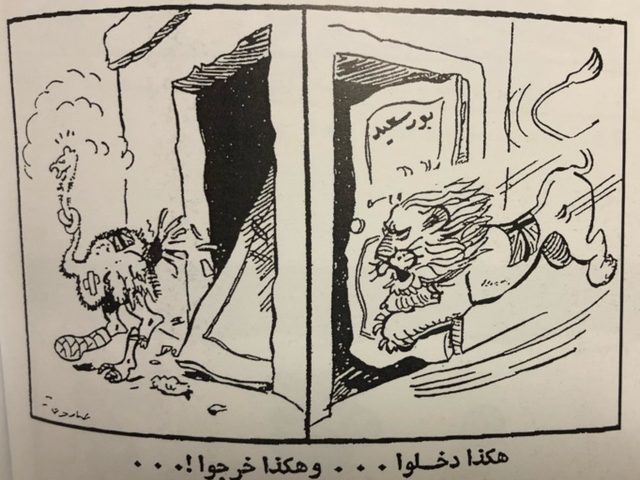
This source published by the Arabic newspaper Akbar el-Yom by the author named Sarokham on the 12th of December 1956 illustrates and contrasts how Britain had entered and left Port Said. This is a perfect example of British army’s prestige declining in Egypt as the British army is represented by the lion and the ostrich highlighting how weak they looked to Egypt after the crisis.
Egypt had utilised propaganda for its own people but also used it to alter how the world viewed Britain and its army that had killed and destroyed Egyptian people and their homes highlighted in these images. This was effective as Britain was part of the Tripartite aggression and also committing atrocities such as killing and harming innocent civilians. They had become “morally bankrupt” and viewed as the unjust aggressors to the rest of the international community. (Heikal, 2006) This had worsened their influence in the Middle East due to the growing Arab nationalism in some of the Arabic states which by default sided with the Nasser.

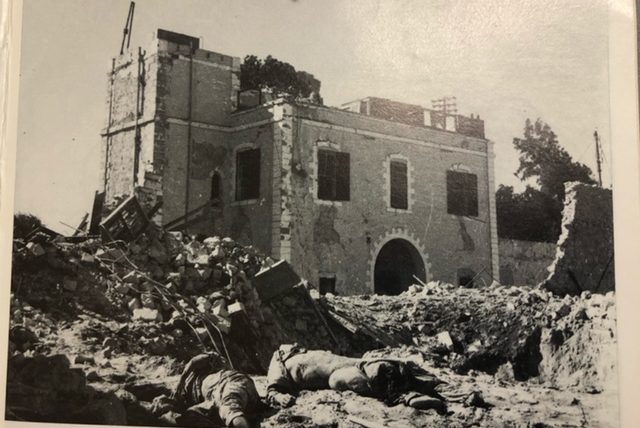
Mohamed Heikal argued that “Suez had many losers, and two clear victors – President Nasser and the Americans. Britain’s attempt to re-establish itself in the area it regarded as peculiarly its own had resulted in disaster … they only had one rival competing with them for influence, and that was Nasser.” (Heikal, 1986) Britain’s embarrassing loss to Egypt leading to its withdrawal from the country and the Middle East resulted in the decline of the British army’s prestige in Egypt proves the thesis to be true.
Pakistan and India
Both India and Pakistan are paired up together due their shared experience with the British Empires colonial army. They were combined as one India until Britain had partitioned the country creating two separate states in 1947. This partition had uprooted ten million people from their homes as they were forced to move due to the partition of states. Britain has had a long colonial history with India/Pakistan. It had committed other atrocities such as the Amritsar massacres in 1919 and the Indian famine in 1943 resulting in the death of millions of Bengali’s.
Both had nearly identical experiences however with the Suez crisis both states had two completely different approaches. Nehru’s India had supported Nasser but remained neutral due to its Commonwealth relation with Britain. Pakistan viewed Nasser as a rival and had also joined the Baghdad Pact in which it believed Britain could uphold its promise to defend it against communism. The British army’s prestige decreased for both states as the Suez showed that Britain’s military did not have the financial clout to support its army to uphold the Baghdad Pact and India had more benefits from Egypt such as access to the Suez canal. Both states did condemn the Tripartite aggression with Nehru “the Prime Minister well represented and forcibly voiced the feelings of the people” sending a letter to the United Nations security General on the 31st of October (Mohan, 1960). The Pakistan public reacted similarly to the the Suez crisis as there were 300,000 people rallying in Lahore in support of Egypt and in Karachi a mob had burned down the British High Command while shouting anti-british slogans. ( Pike, 2009).
The Hindustan Times highlights how the British army is portrayed in 1951 against liberation battalions in which they had to evacuate the canal towns after striking a deal with the Egyptian government. The British army is implicitly viewed in a negative light as they are described to use emergency Air Force reinforcements as they must replace Egyptian technicians and labourers who had walked out and the newspaper states that they are holding the canal as they do not own it. (Hindustan Times, 2021) As David Reynold debated “for an Egyptian ex-colonel to twist the lion’s tail, and get away with it, was a palpable and lasting blow to national self-esteem and international prestige”.(Reynold in Peden, 2012). This was true for both Pakistan and India and the Suez defeat had affected the army’s prestige as Soheil Hashimi explains that “ Great Britain’s claims to be a major world power and the Arabs’ reliable ally had been tarnished”. (Hashimi, 2011). Indeed, Britain’s loss at the Suez Crisis had directly affected Britain’s status as a world power and alongside it, its ability to influence the Middle East with Nasser and Egypt replacing the power vacuum and its former colonies such as India having replaced them with Egypt resulting in the British army’s image being tarnished as it was the main tool to maintain the British Empire which has collapsed proving the thesis to be valid as the Suez had decreased the British Army’s image.
Conclusion
Overall, the thesis is proven to be true as the Suez had decreased the prestige of the British army for the colonies however it is false for Britain itself as it focused on the Eden’s failures rather than the army however that cannot apply for Egypt as British prestige was decimated after removing British influence and empire in the region. This is also true for India and Pakistan as India did not side fully support Britain even though it is considered to be a world power and Pakistan had lost faith in the British army due to its lost power and influence in the region it could not do what Britain promised in the Baghdad pact.
Bibliography
Benson, Timothy and Gorst, Anthony. Suezcide: A Cartoon History of the 1956 Suez Crisis (London, 2006)
Darwin, John. The Empire Project: The Rise and Fall of the British World System 1830 – 1970. (Cambridge, 2009)
H. Beeley, ‘The Middle East’, in W. R. Louis and H. Bull, eds., The special relationship: Anglo-American relations since 1945 (Oxford, 1986)
Hashmi, Sohail H. “‘Zero Plus Zero Plus Zero’: Pakistan, the Baghdad Pact, and the Suez Crisis.” The International History Review 33, no. 3 (2011): 525–44. http://www.jstor.org/stable/23033197.
Heikal, Mohamed. “Cutting the Lion’s tail; Suez through Egyptian eyes” (London, 1986)
Kitchen, James E. “Violence in Defence of Empire: The British Army and the 1919 Egyptian Revolution.” Journal of Modern European History / Zeitschrift Für Moderne Europäische Geschichte / Revue d’histoire Européenne Contemporaine 13, no. 2 (2015): 249–67. https://www.jstor.org/stable/26266181.
Lockman, Zachary. Contending Visions of the Middle East: The History and Politics of Orientalism. (Cambridge, 2004)
Mahmood, Khalid. “BRITAIN AND THE SUEZ CRISIS.” Pakistan Horizon 15, no. 2 (1962): 111–28. http://www.jstor.org/stable/41392707.
MOHAN, JITENDRA. “India, Pakistan, Suez and The Commonwealth.” International Journal 15, no. 3 (1960): 185–99. http://www.jstor.org/stable/23595835.
PEDEN, G. C. “SUEZ AND BRITAIN’S DECLINE AS A WORLD POWER.” The Historical Journal 55, no. 4 (2012): 1073–96. http://www.jstor.org/stable/23352191.
Pike, Francis Empires at War. ( London. 2009)
Said, Edward W. Orientalism. (New York, 1978)
Shaw, Tony. “Eden, Suez and the mass media: propaganda and persuasion during the Suez crisis.” (London, 1996)
Turner, Barry. Suez 1956: The Inside Story of the First Oil War. London, 2007
Vaughan, James. “Foreign Office and British Embassy reports of Egyptian Propaganda” (1956)

